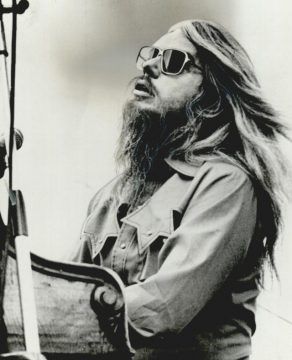by Akim Reinhardt
 3QD: The old cliché about a guest needing no introduction never seemed more apt. So instead of me introducing you to our readers, maybe you could begin by telling us a little bit about yourself, perhaps something not so well known, a little more revealing.
3QD: The old cliché about a guest needing no introduction never seemed more apt. So instead of me introducing you to our readers, maybe you could begin by telling us a little bit about yourself, perhaps something not so well known, a little more revealing.
God: I am, I am.
3QD: Indeed. But what about your early years? We don’t often hear much about your childhood. What was it like to emerge from nothingness? Or did you precede nothingness, first creating the void and then all of the somethings that filled it up? Or, as some speculate, were you and the great nothingness one and the same? Did you, personally, go from nothing to everything?
God:
3QD: Perhaps too difficult to talk about. We’ll let that be. Nonetheless, you quite literally burst onto the scene, creating everything in 6 days. I don’t think it’s worth getting into your sense of time versus human constructions of time, but whether it was six of our days, or six of yours which might be billions of our solar years, it was a phenomenal debut in the truest sense. Bigger than Elvis’ first single, the Beatles first album, or Justin Bieber’s first YouTube video. More gravitas than Shakespeare’s first play, Henry V, Part II. More charisma than Julie Andrews’ screen debut in Mary Poppins. Scarier, in many ways, than Mary Shelley’s Frankenstein, which she wrote when she was just 19. Better received by the public than Gary Coleman’s turn as Arnold “What’chu talkin’ about, Willis” Jackson on Dff’rent Strokes. More disorienting, in many ways, than Joseph Heller’s Catch-22. Some would even say more impressive than Orson Welles’ screen directing/acting debut, Citizen Kane, which he pulled off when he was almost inconceivably young, only 25 years old. But here you were, creating the entire universe and everything in it as your first known work of art. How did you handle that? Were you able to maintain a sense of normality, or, like so many young artists who receive so much fame and praise so quickly, did it damage your sense of self or impede how you related to others?
God: Read more »

 I can’t sing. Or so I always thought. A notorious karaoke warbler, I would sometimes pick a country tune, preferably Hank Williams, so that when my voice cracked, I could pretend I was yodeling. Then one night, I stepped up to the bar’s microphone and sang a Gordon Lightfoot song.
I can’t sing. Or so I always thought. A notorious karaoke warbler, I would sometimes pick a country tune, preferably Hank Williams, so that when my voice cracked, I could pretend I was yodeling. Then one night, I stepped up to the bar’s microphone and sang a Gordon Lightfoot song. He released 33 albums and recorded over 400 of songs, earning two Grammys among seven nominations. Yet you probably don’t know who Leon Russell was. For some people he’s a vaguely familiar name they have trouble putting a face or a tune to. Many more have never even heard of him. Because despite his prodigious output, Russell also had a way of being there without letting you know. He was the front man whose real impact came behind the scenes. He was very present, but just out of sight.
He released 33 albums and recorded over 400 of songs, earning two Grammys among seven nominations. Yet you probably don’t know who Leon Russell was. For some people he’s a vaguely familiar name they have trouble putting a face or a tune to. Many more have never even heard of him. Because despite his prodigious output, Russell also had a way of being there without letting you know. He was the front man whose real impact came behind the scenes. He was very present, but just out of sight. Smacked my head on the pavement while jogging across campus in the rain. Had my hands on my stomach, holding documents in place underneath my shirt to keep them dry. So when my foot went out after skipping over a puddle, I couldn’t get my front paws down in time to brace my fall as I corkscrewed through the air, landing on my hip and shoulder, and whiplashing my head downward. Consequently I don’t have the brain power to crank out 2,000 fresh words. So here’s a dated piece about Baby Boomer navel gazing and ressentiment.
Smacked my head on the pavement while jogging across campus in the rain. Had my hands on my stomach, holding documents in place underneath my shirt to keep them dry. So when my foot went out after skipping over a puddle, I couldn’t get my front paws down in time to brace my fall as I corkscrewed through the air, landing on my hip and shoulder, and whiplashing my head downward. Consequently I don’t have the brain power to crank out 2,000 fresh words. So here’s a dated piece about Baby Boomer navel gazing and ressentiment.